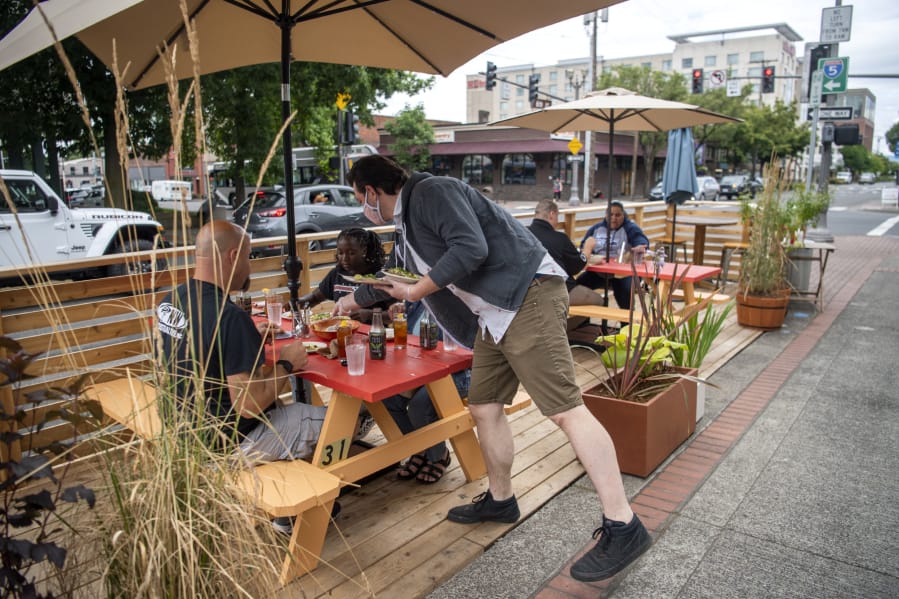It’s been less than two months since Mayor Anne McEnerny-Ogle floated the idea of bringing “parklets” — street parking spaces converted into outdoor restaurant seating areas — to Vancouver, and the program has already led to four downtown installations.
Parklets are one of two elements of the city’s Street Eats program, which is aimed at giving restaurants new ways to expand their seating during the COVID-19 pandemic while still complying with the 50 percent capacity limit imposed by Phase 2 of Washington’s reopening plan. The city is partnering with Vancouver’s Downtown Association to help grow the lineup of participants.
The other component is sidewalk cafes, which allow restaurants to create makeshift patio seating areas on their front sidewalks. That program predates the pandemic, but the Phase 2 situation has prompted 18 businesses to either apply for the first time or renew their sidewalk licenses, and several have expanded the size of their existing patio spaces.
Parklets
The Mighty Bowl was the first to jump on the parklet bandwagon, debuting an outdoor seating area to coincide with the restaurant’s June 9 reopening.
The parklet’s elaborate woodwork and high-backed seats were designed by Vancouver-based LSW Architects and produced in a partnership with RIFF Creative, Frontdoor Back, Vancouver’s Downtown Association and the city. Catworks Construction helped install the semi-modular structure and Gro Outdoor Living supplied plants for the planter boxes.
A second LSW parklet found a home outside Ice Cream Renaissance in Uptown Village, augmenting the restaurant’s existing sidewalk seating. The parlor’s small interior meant that there could be virtually no indoor seating in Phase 2, according to owner Brandon Angelo, so a major outdoor seating expansion was a must.
“We knew just having a couple tables out there would kind of hurt us,” he said.
Little Conejo and City Sandwich debuted their own downtown parklets in June, both of which were designed in-house and built with the help of friends or business acquaintances.
The parklets all share a basic set of design elements dictated by the city’s program rules, including a flat deck surface flush with the curb, a minimum 30-inch perimeter railing and a gap under the deck to allow stormwater to keep flowing along the curbs.
Beyond that, restaurants are free to add their own design twists such as City Sandwich’s use of redwood, which manager Robin Herz said was intended to complement the restaurant’s brick storefront. Little Conejo co-owner Mychal Dynes said he designed his restaurant’s parklet to have an inclusive, casual feeling, like a friend’s back porch.
“I really just wanted it to look like a deck,” he said.
Herz and Dynes said the parklets have made a big difference for business, with the extra seating coming close to making up for the loss of indoor seats — and customers often seem to prefer the outdoor dining.
The parklets are relatively simple structures, but there’s still a cost; Herz said the City Sandwich parklet cost about $4,000 to build. Vancouver’s Downtown Association President Michael Walker said the Mighty Bowl and Ice Cream Renaissance parklets each cost about $3,000 for materials, with LSW and RIFF donating their time for the design work.
In light of the investment, Herz said City Sandwich hopes to see the parklet program extended beyond the current pilot phase.
“We’re hoping that it sticks around past September,” she said. “We’ve gotten a lot of really good feedback, even when we were building it.”
The city of Battle Ground debuted its own parklets program in early June, and planning supervisor Emily Lutz said two restaurants have applied so far: El Rancho Viejo and Northwood Public House and Brewery.
Sidewalk cafes
Ice Cream Renaissance has the only parklet in uptown so far, but several other restaurants have taken advantage of the wide sidewalks that line Main Street through the district, creating large patios that substantially raise their seating capacity.
Uptown Barrel Room owner Dwayne Christensen said he considered a parklet but was concerned about traffic passing so close to seated customers. He opted to expand his patio seating instead, replacing a few two-person tables with four longer ones designed to seat up to eight (although currently limited to five each due to Phase 2 rules).
Christensen recently moved the patio fence closer to the parking lane, and said he plans to add overhead “sails” that will extend from the restaurant’s current awning to cover the whole patio. The expanded patio is partly a creation of necessity, he said, but he wanted it to help beautify uptown’s streetscape.
Across the street at Tip Top Too Tavern, bartender Raechel Morrow said the bar has expanded its patio facing West 21st Street and added seven new tables on the sidewalk along Main Street. The Phase 2 restrictions limited the bar to 35 patrons inside, but the patio expansion made room for another 20 guests.
“It definitely helps, especially with the nicer weather,” she said.
In a break from past policy, restaurants with liquor licenses are now allowed to serve alcoholic beverages in both parklets and sidewalk cafes, provided that they meet certain Washington Liquor and Cannabis Board requirements such as having a private, fully fenced area.
“So, for instance, two bars that were across the street from each other couldn’t be sharing the same sidewalk seating,” said board spokeswoman Julie Graham.
The state board has been working with individual municipalities to implement the temporary new rules on a case-by-case basis, Graham said, with the goal of helping out restaurants that are struggling with limited seating.
The new rules mean that approved restaurants can serve alcohol even if the parklets aren’t physically connected to the restaurant building. In Vancouver’s case, a series of blue tiles on the sidewalk form a “virtual fence” to connect restaurants like Little Conejo and Uptown Barrel Room to their respective seating areas, while keeping the sidewalk open for pedestrians.
Downtown visitors can expect to see even more sidewalk seating options in the coming weeks. A host of downtown restaurants and coffee shops have applied for parklets or patios, including Syrup Trap, Vinnie’s Pizza, Niche Wine Bar and Compass Coffee. Several Waterfront Vancouver establishments have also applied, including the Brian Carter Cellars, Airfield Estates and Pepper Bridge winery tasting rooms.




